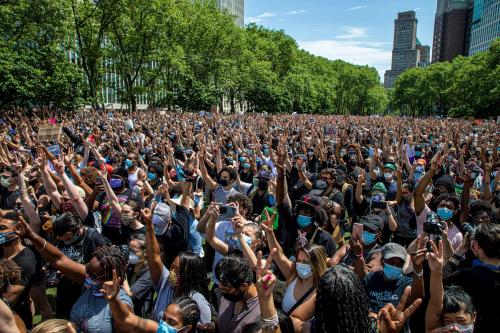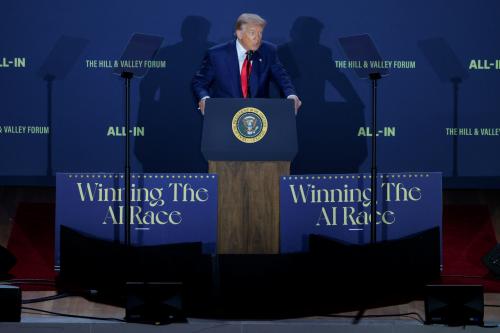This article is part of the New Transatlantic Bridge Initiative. For more than 70 years, the transatlantic community has been among the world’s most important partnerships and alliances and an anchor of global democracy, stability, and prosperity. That community includes governmental and nongovernmental relationships in the U.S. and Europe, as well as Canada, the European Union, NATO, and other entities and stakeholders. The transatlantic alliance is now under internal and external stress in ways that we have not seen in many decades—if ever. In response, the New Transatlantic Bridge Initiative by the Brookings Anti-Corruption, Democracy, and Security (ACDS) project analyzes those stresses and engages a wide set of stakeholders on both sides of the Atlantic to identify how those stresses can be addressed.
Certainly since World War II, and arguably since World War I, the U.S.-Europe relationship has been the world’s most important alliance and an anchor of global democracy, stability, and prosperity. That alliance is now under internal stress in ways that we have not seen in decades—if ever. In response, the Brookings Anti-Corruption, Democracy, and Security (ACDS) project is launching a “Transatlantic Bridge” initiative, which will seek to analyze those stresses and how they can be addressed with the quality, independence, and impact that are the hallmarks of the Institution’s work.
As one of the keystones of that bridge, we will be conducting interviews with champions of the transatlantic relationship in the U.S. and Europe alike. For the first interview in this series, Norman Eisen interviewed Jakub Klepal in Prague, Czech Republic, on April 3, 2025, at 10:00 a.m. EDT/4:00 p.m. CEST. Eisen is a Brookings senior fellow, the lead researcher for all three editions of the Brookings Democracy Playbook, and the former U.S. ambassador to the Czech Republic. Klepal lives and works in Prague, and he is the executive director of Forum 2000, a foundation that “pursues the legacy of Václav Havel” through support of democracy, human rights, civil society, and more.
The following text has been edited for length and clarity.
Maintaining the transatlantic relationship
Norman Eisen:
Did you ever imagine that transatlantic relations would be in the place they are now? What’s your perspective on the current moment?
Jakub Klepal:
Well, first of all, it’s still just a moment, so we’ll see how it develops. It’s definitely something to be concerned about, but the transatlantic relationship has been the pillar of freedom and democracy in the world for the last more than 100 years, or more.
Norman Eisen:
You count from World War I.
Jakub Klepal:
At least, if not longer.
Norman Eisen:
People forget that because they’re not as close to the origins of transatlanticism, but modern Czechoslovakia was founded with the Pittsburgh Declaration and the Washington Declaration, so the Czechs do not forget America’s entry into modern transatlanticism.
Jakub Klepal:
Exactly. And it goes beyond that. There is a long tradition, very deep structural relations, and mutually shared ideas and values. So, we cannot just forget about it in one or two months. We maybe have to pause a little bit but stay calm and see how we can continue this relation, even in the more difficult circumstances that we are in now.
Norman Eisen:
And how can we maintain that relationship?
Jakub Klepal:
First of all, I still believe that, despite what’s going on, there is a mutual need for each other, security-wise and politically. International politics and order are such a dangerous place these days that Europe and America each need each other, despite what’s happening on the surface. But there is a big group of civil society organizations, think tanks, and business people that know each other and work with each other, and that will continue. That will be affected by this in some way, but it may help us to figure out what we actually need each other for and what the values are guiding this relationship. So right now, the moment is difficult, but it’s not fatal, and it’s not tragic.
Impacts of recent events on civil society and the business sector
Norman Eisen:
Let’s discuss the civil society and business sectors. How have the past two months affected those, for good or for bad?
Jakub Klepal:
Well, there was an immediate effect with the U.S. funding freeze for the United States Agency for International Development (USAID), National Endowment for Democracy (NED), National Democratic Institute (NDI), International Republican Institute (IRI) and so on, so that that immediately affected those very negatively, of course.
For our organization, we have two grants that are affected. We will see if our funding from that source continues. What is happening complicates our lives a little bit, but there are organizations in this country that have been affected much more, maybe via USAID funding.
Because we work with global partners, I know of a number of organizations internationally in circumstances that are much more serious than ours that have had 100% of their funding affected. Two of them were telling me that they may be shutting down because 100% of their funding was of U.S. origin.
Adapting the transatlantic alliance to a changing world
Norman Eisen:
Is it fair to say that the whole point of the transatlantic relationship is that democracy is not entirely on one side of the ocean or the other?
Jakub Klepal:
I think transatlanticism is a very wide concept that is, as I said before, based on a number of things: on common history, shared values, and mutual interest. And it’s something that nobody invented. It’s a thing that makes sense and somehow, I believe, we will come back to it as things maybe calm down a little bit. We may come to a different understanding, but some understanding of how this should work.
Norman Eisen:
So, you’re not ruling out a theory of present disruption and eventual recalibration around a new normal and stability in transatlantic relations? Are there any advantages to Europe in this shock? For example, in increasing European self-sufficiency and even autonomy on the defense side?
Jakub Klepal:
Yes, actually. So far, if he doesn’t overdo it, Donald Trump is basically working for us as Europeans, because he is making us aware where our weak spots are, and where we need to actually work much harder to focus on security, integration, and cooperation. He has given us the realization that there is a dangerous world out there, and there is nobody else that will deal with it than us.
Norman Eisen:
The one place where I’m going to push on your theory that Donald Trump is helping you is with Putin. Isn’t he unleashing Putin to do more mischief?
Jakub Klepal:
Of course, this was said in the sense that there is some positive to what’s happening. And I also said if Trump doesn’t overdo it. He’s close to overdoing it in some aspects. It is difficult for me at the moment to read what the actual U.S. policy position—or his position—is there, but so far the indications and the signals are very problematic and preoccupying, because the way to deal with Russia is not to flatter and to make concessions without getting anything in return. You’ve probably been told this many times here in Europe, but Russia only understands power and force, and if it’s not stopped and properly dealt with in this way, it will just continue and it will go on.
Strategies for addressing democratic backsliding
Norman Eisen:
At Brookings, I’ve led a team of researchers and dozens of scholars in writing three editions of what we call the Democracy Playbook on how to address democratic backsliding. From your perspective in Prague, but also globally as the head of Forum 2000, what are the lessons of how to address democratic backsliding that can be relevant in this moment?
Jakub Klepal:
I think there are many things, but I will just say one aspect and that’s civil society, because I’m part of civil society, and we’ve experienced a lot of that here. That’s one thing that I think we don’t see so much in the United States right now, which is kind of surprising to us. And maybe we just are not looking properly but, in this country, and in many others around the world, when things start to get difficult with democracy—when there is democratic backsliding, weakened institutions, attacks on the judicial independence and the media, some of which is happening in the States right now—civil society does mobilize and citizens start to mobilize. I think that’s very important.
Norman Eisen:
Yes, and the transatlantic autocracy networks are on the rise. Is it time for a North Atlantic Treaty Organization (NATO) of democracy? We have a military NATO, and it has a certain geographic scope. Should we have a global NATO for democracy?
Jakub Klepal:
Well, we’ve been arguing for that idea for a long time. Forum 2000 has been working towards something like this, whatever you call it, it can be a global coalition of democratic actors. But this is actually something that’s being gradually formed, a network of government, civil society, and citizens that treasure democratic values, the values of freedom, and look for ways to work together to protect it.
Norman Eisen:
What’s the role of Forum 2000 in doing that?
Jakub Klepal:
We try to provide one piece of infrastructure for that, so we convene, we put together events, we structure programs with this idea, we nurture networks around this idea, and that’s I think one of our goals.
History of Forum 2000
Norman Eisen:
Can you explain the history of Forum 2000 and how you came to be a part of it? What was it like for you as a young person with the institution being led by our beloved friend, and of course, when Havel was alive?
Jakub Klepal:
Well, Forum 2000 was established by former President Havel back in the 1990s when he was still in office, and he did it together with Elie Wiesel, a U.S. intellectual with European Jewish background. So, there was this strong connection of minds, and they basically came up with the idea that they needed to bring together people around the challenges civilization was facing at the threshold of the new millennium. That’s where the name comes from: Forum 2000.
So that’s how it started. And it gradually developed into an important institution that sort of has as its core mission the defense of democracy, but also thinking about democracy, about these challenges, and about ways that we all can make sure that democracy lives and is stronger. And how we can work together to foment it and to cherish and protect it.
Norman Eisen:
How did you get involved in Forum 2000?
Jakub Klepal:
Pure coincidence. I knew about Forum 2000 and always appreciated it. But when I started, Oldřich Černý said that he had a major crisis within the organization that he needed help with, and I was recommended.
I came back from studying abroad. I was at my Fulbright scholarship stay in the States. And then in Mexico for another scholarship. So, I came back to Prague, and I was just looking around. It was like two weeks after I came back. Oldřich approached me and said I have a major crisis in the organization.
Norman Eisen:
What was the crisis?
Jakub Klepal:
It was basically internal changes that he was making, and I think there was a different understanding within the organization of how to carry on. So that was it.
Václav Havel and the current transatlantic moment
Norman Eisen:
What are the lessons of Havel if he were watching this moment? You knew him. This is an organization that was started by him. What would he say about this moment in transatlantic democracy?
Jakub Klepal:
I cannot say what he would say because it’s impossible. But when I worked with him, he was seen as a very impractical intellectual who had major thinking power but was very hands off and left things to other people, which was not true at all. He was very practical, very meticulous, and very much directing things that he considered important. And I knew him in that role, so I think today he would think of practical ways of how to address the issue. He would, of course, frame it, but he would look for concrete things to do and how to repair what he felt needed to be repaired.
Public sentiments on democracy
Norman Eisen:
What’s the mood of people towards democracy in this moment, both in Prague and in your big Forum 2000 network, which has pro-democracy activists all over the planet?
Jakub Klepal:
I think people are of course confused and bewildered, and sort of experiencing this anxiousness with what’s going to happen tomorrow because that’s always a challenge and the developments are very, very quick. Generally, I think people are starting to understand that we are in a new moment, that this is a time when we need to start looking at things a little differently. It will be more complicated, but on the other hand there are also some important opportunities and lessons that can be taken from this. And of course, as I mentioned in the beginning, in our networks there are some groups and some people that are trying to address the very practical situations of their funding, because many people and groups have been affected. I was surprised actually from the feedback that we received from our partners, how they are mostly doing well and reaching out to new partners to find new ways to work. So overall I would say the mood is of change and trying to understand. But also not of desperation, not of too much pessimism.
Global perceptions on American democracy
Norman Eisen:
Do you have any thoughts on how to make the case for the importance of America’s place in the world and, in particular, the importance of foreign aid?
Jakub Klepal:
Well, America at one point was really the dominant economic force in the world. In the early 90s, it was the dominant political and security force in the world. Today, the situation is a little bit different, but it has always led mostly by example and by positive, soft power, from Joseph Nye. That has been real and is maybe one reason why people are now so frustrated with what’s happening. Many people just adore America because it’s the land of the free, it’s the model democracy, or it used to be the model of democracy. It’s a country that helped us in Europe twice and, actually, in our Czech case three times, to overcome a moment of great difficulty (World War I, World War II, the Cold War).
So, people just always looked up to America, loved America, adored America, listened to Radio Free Europe, drank Coca-Cola, and watched American movies. So, there are a number of layers that have posed sort of sentimental, moral, and ethical attractions for people. And I think that’s the greatest damage right now; that for many people what has happened is this approach in Washington of “we only care about ourselves now” and “you are all basically using us.” That’s something that can be dangerous, and for that reason we need to be patient and say, okay, it is just some people in America saying this, this is the current administration, and we have to maybe calm a little bit and sort of wait for things to settle down a little.
This year's Forum 2000
Norman Eisen:
And what will the theme be of Forum 2000 this year?
Jakub Klepal:
We don’t have it yet. We are now developing it because it’s still a couple of months away, but it will definitely deal with what is happening in the world in transatlantic relations and how the world order is now being reshaped.
Parting thoughts for the reader
Norman Eisen:
Any last words for the audience that will be reading this interview?
Jakub Klepal:
Be patient, be optimistic, and we will overcome.
Norman Eisen:
How does Czech history (over the past 100 years or longer, but particularly the history of Czech democracy since 1918) inform that advice?
Jakub Klepal:
I think it sort of can be used as evidence. We had moments of difficulty, periods of oppression and darkness, but somehow, we always overcame. One thing that also needs to be mentioned there is that it’s not coming for free. You have to work for it. Even in dark times you should not give up hope and effort, and you should constantly work to somehow get through this and bring about a better future.
-
Acknowledgements and disclosures
The authors would like to thank Julianna Melendez, Renée Rippberger, and Madison Gee for fact-checking assistance, and Eric Urby for editorial assistance.
The Brookings Institution is committed to quality, independence, and impact.
We are supported by a diverse array of funders. In line with our values and policies, each Brookings publication represents the sole views of its author(s).







Commentary
The Transatlantic Bridge: Jakub Klepal on civil society’s role in sustaining democracy
May 7, 2025